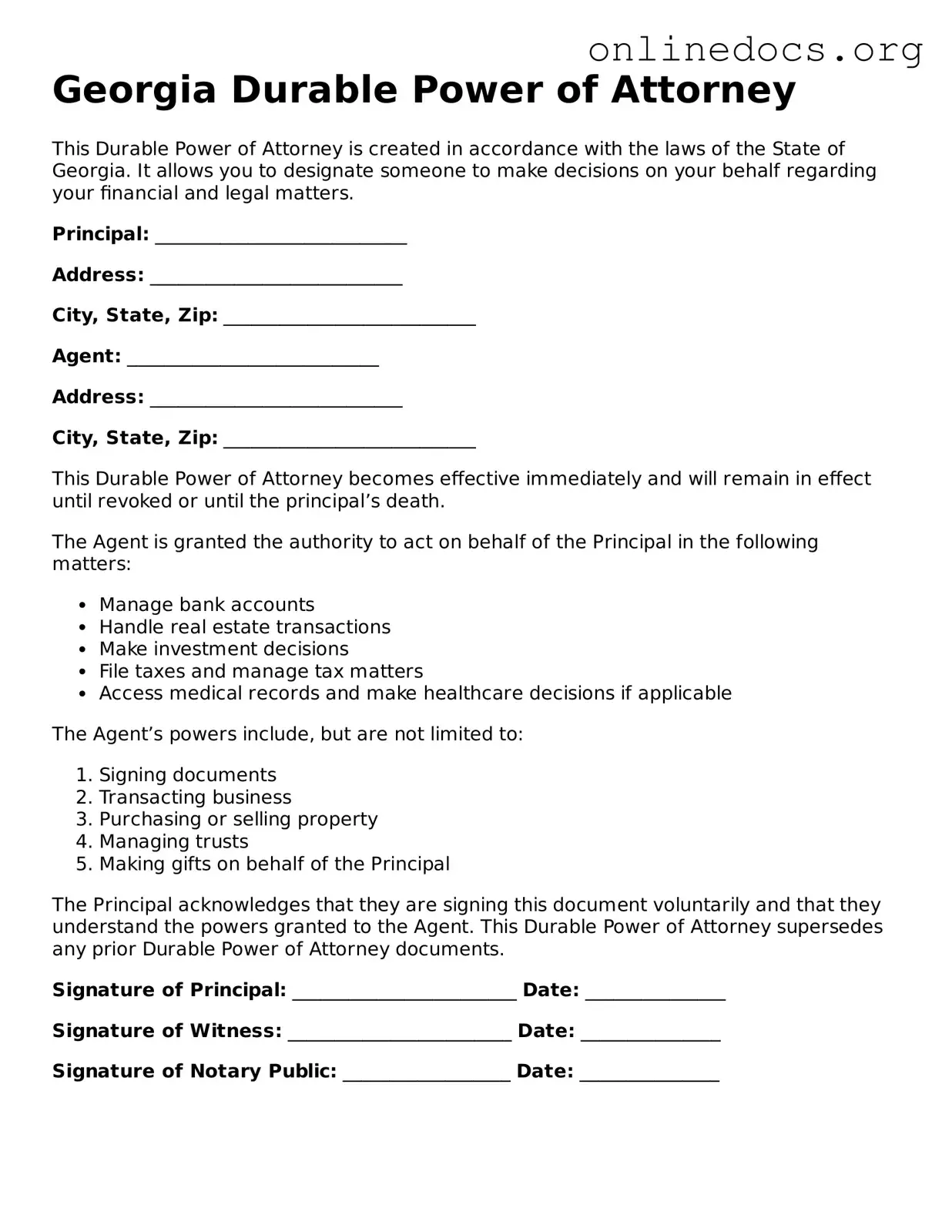The Georgia Durable Power of Attorney form shares similarities with the General Power of Attorney. Both documents allow an individual, known as the principal, to designate another person, referred to as the agent, to make decisions on their behalf. However, the General Power of Attorney becomes ineffective if the principal becomes incapacitated, while the Durable Power of Attorney remains valid under such circumstances, ensuring continuous support for the principal's needs.
Another document akin to the Georgia Durable Power of Attorney is the Healthcare Power of Attorney. This specific form empowers an agent to make medical decisions for the principal when they are unable to do so themselves. Like the Durable Power of Attorney, it is designed to be effective even if the principal becomes incapacitated. However, the Healthcare Power of Attorney is focused solely on health-related matters, whereas the Durable Power of Attorney can cover a broader range of financial and legal decisions.
The Living Will is also similar in that it addresses the principal's wishes regarding medical treatment in situations where they cannot communicate. While the Durable Power of Attorney allows an agent to make decisions, the Living Will specifically outlines the types of medical care a person wishes to receive or refuse. This document provides clarity on the principal's preferences, complementing the broader powers granted in a Durable Power of Attorney.
The Revocable Trust is another related document, as it allows individuals to manage their assets during their lifetime and designate beneficiaries after their death. Both the Revocable Trust and the Durable Power of Attorney can help in asset management and ensure that the principal's wishes are honored. However, the Revocable Trust is primarily concerned with the distribution of assets, while the Durable Power of Attorney focuses on decision-making authority in various aspects of life.
The Financial Power of Attorney is closely related to the Durable Power of Attorney, as both authorize an agent to handle financial matters on behalf of the principal. The distinction lies in the scope of authority; the Financial Power of Attorney may be limited to specific financial transactions, whereas the Durable Power of Attorney can encompass a wider range of powers, including legal and health-related decisions.
The Medical Power of Attorney is another document that aligns with the Georgia Durable Power of Attorney. This document allows an individual to appoint someone to make healthcare decisions when they are unable to do so. While both documents empower an agent to act on behalf of the principal, the Medical Power of Attorney is strictly focused on healthcare, whereas the Durable Power of Attorney covers a broader array of responsibilities.
For those interested in renting a property, it's essential to understand the importance of the Rental Application form. This document not only collects vital information from prospective tenants but also aids landlords in assessing the qualifications of applicants. By completing this form, potential renters can provide their personal history, employment details, and references, which are crucial in the selection process. For more details on how to navigate the rental application process, you may visit legalformspdf.com.
The Guardianship document is similar in that it involves decision-making for an individual who is unable to manage their affairs. However, Guardianship is typically established through a court process and may require ongoing oversight, while the Durable Power of Attorney is created by the principal and can be revoked at any time. This flexibility allows the principal to maintain control over their decisions until they choose to delegate authority.
The Advance Directive is comparable to the Georgia Durable Power of Attorney in that it allows individuals to express their healthcare preferences in advance. While the Durable Power of Attorney appoints an agent to make decisions, the Advance Directive serves as a guide for those decisions, detailing the principal's wishes regarding medical treatment. Both documents work together to ensure that a person's healthcare choices are respected.
Lastly, the Will has similarities with the Durable Power of Attorney in that both documents address the management of an individual’s affairs. However, a Will takes effect only after a person’s death, directing how their assets should be distributed. In contrast, the Durable Power of Attorney is effective during the principal’s lifetime and allows for the management of financial and legal matters while they are still alive, particularly if they become incapacitated.
